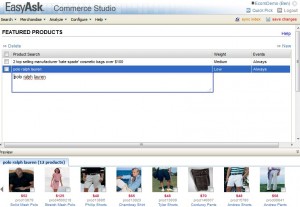Merchandising has been around for as long as there have been marketplaces. Both veteran retailers and academic experts have spent countless hours analyzing and honing the best practices for displaying products for maximum sales and profits.
While many of those tried-and-true principles are applicable to the world of online retailing, there are important differences. Understanding those differences, and exploiting the advantages that new technology is bringing to the retail landscape, can make a huge difference in your bottom line.
First, what’s the same: The concept of promoting certain products over others, cross-selling and up-selling are universal, no matter whether you are selling your goods in a corner boutique or an online superstore.
It seems intuitive that eCommerce platforms should simplify these tasks, but in many cases that promise has not been fulfilled. With many eCommerce platforms, cross-sells and upsells often need to be configured on an item-by-item basis, which can translate into an onerous and time-consuming task.
Similarly, the ordering of items on display pages is often based on rudimentary algorithms which assign a static “priority value” to each item. Merchandisers wanting to push certain products to the top of pages have to re-number their priority values – another thankless chore that makes it hard for merchandisers to react quickly to changing market conditions.
Deciding where merchandise should appear on category and subcategory pages is hard-wired in many eCommerce platforms. That wouldn’t be so bad if the retailer only had to configure things once and be done. But inventory is never static – and as products are added or removed, additional time and effort is constantly needed to keep the most attractive products from a merchandising perspective at the forefront.
All of these challenges are multiplied for large and/or highly active retailers.
EasyAsk completely eliminates these issues and delivers solutions that allow merchandisers to react quickly and easily make changes in how products are displayed, upsold and cross-promoted.
For example, using natural language rules a merchandiser can feature specific products by identifying common product attributes and presenting them to the customer in a creative manner, such as “Hot Items” or “Great Values.”
Changing the display order is just as simple. A merchandiser can create and apply a variety of different rules (using plain English) to order products based on any number of attributes, including product attributes such as price, color or brand or operational attributes such as inventory level, popularity and margin.
Cross-sells and upsells are also easily implemented using natural language rules. Let’s say a retailer wants to cross-sell sunglasses with swimwear. With EasyAsk Commerce Studio, the merchandiser would create an event rule for “swimwear” and an action rule for “sunglasses” with a promotion type of “cross sell.” Done. Quite a bit easier than selecting every swimwear item and manually placing sunglasses in the “related products” area!
To entice a customer looking at handbags to consider a premium brand such as Kate Spade handbags, a merchandiser would simply set up an event rule of “NOT Kate Spade handbags” and an action rule of “Kate Spade handbags” with a promotion type of “upsell.” This would ensure that Kate Spade handbags appeared as “Items You Might Be Interested In” on any page where handbags other than Kate Spade were shown.
Classic merchandising techniques such as cross-selling, upselling and product promotions still hold powerful promise for eCommerce retailers. But the ability to quickly react and adapt to changing trends and market condition makes these tactics even more valuable to the bottom line. In our next installment, we’ll look at how to maximize some of the newer merchandising considerations that are unique to the age of internet retailing.






 We’re very excited to be exhibiting at IRCE 2013, going on right now in Chicago from June 4-7. As of now, the show has officially begun with the Opening Reception taking place in the Exhibit Hall.
We’re very excited to be exhibiting at IRCE 2013, going on right now in Chicago from June 4-7. As of now, the show has officially begun with the Opening Reception taking place in the Exhibit Hall.